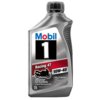Kevcules
Site Supporter
Agreed about the JASO MA wet clutch test. But the mark is missed about SN and SP rated oils because oil in those API rating will have massive amounts of additives that make them resource conserving. I am running into this problem now trying to find conventional oil for my car and lawn mower and I can't find it. 225 K miles on my Toyota using Pennzoil yellow bottle conventional oil now they don't make it any more. According to an oil forum in order to meet the governments new fuel mileage goals oil had to change so that's why only GF 6A and API SP will be sold. A synthetic with a ton of addtives in them. Like I posted earlier I've been following the development of this new rated oil and I promise you a motorcycle wet clutch was not given a thought. These new oils were developed especially for cars.
They still sell it locally here.(Canada) Are you saying they don't manufacture regular petroleum Pennzoil anymore?
I haven't used regular petroleum oil in the last 15 years or so. The synthetic Pennzoil and Mobil 1 come on sale routinely and I can get between a 4.75L and 5L jug for $29.99. (That's about $10 US.
No ones engine is going to notice a difference between 10W30 VS 10W40. The 40W oil will just protect the engine at a higher temperature in the rare case of an overheating situation. Some people I know use 20W50 with no issues when their bikes call for 10W40. The Jason MA rating is important for out wet clutch situation.
I own three Toyotas and have always used synthetic oil. I know many people who run regular oil and their Toyota engines last an amazingly long time. Those engines seem bulletproof!
Kevin





 .
.

